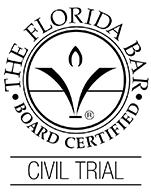To determine the fault for a pedestrian accident, you must establish the negligence of the at-fault party to collect damages. Thus, anyone injured in a pedestrian accident must find the underlying cause of who caused the crash. However, injured pedestrians often have the legal right to seek compensation when a moving vehicle strikes them.
If you sustained injuries when a car struck you while walking along a street, our Lakeland pedestrian accident lawyers is here to help. It’s possible to hold the driver who injured you accountable—especially if you avoid any delay in speaking to an attorney. We’ll review your situation and discuss your legal options.
How Do Pedestrian Accidents Happen?
How your pedestrian accident happened will play a big part in determining who was at fault. These accidents can occur under different circumstances. Often, distractions play a significant role in how these accidents occur. If a driver was texting or grabbing something that fell to the floor of their car, they might not notice a pedestrian stepping into their path.
Impatient drivers are also frequently at fault in these cases. Drivers who are in a hurry often change lanes or accelerate erratically. These actions can lead to an aggressive driver striking a pedestrian they failed to see until it was too late.
Other factors that can lead to a pedestrian accident include the following:
- Severe weather
- Drivers impaired by drugs or alcohol
- Inadequate lighting
- Road construction
- Poorly marked crosswalks
- Missing traffic signs
Establishing Negligence Is Critical in a Pedestrian Accident Case
To recover compensation following a pedestrian accident, you must show the accident occurred due to a negligent act. Usually, this requires proving that the driver who struck you violated the four elements needed to establish negligence:
- The driver owed you a duty of care.
- The driver failed to uphold this obligation.
- The driver’s failure caused the crash.
- You sustained losses because of the accident.
Proving a breach of a driver’s duty of care is often the principal dispute in these cases. For example, in a pedestrian accident case, the motorist might argue that while they did not yield to the right-of-way and struck a pedestrian in an intersection or crosswalk, they did not have enough time to stop safely.
Is the Driver Always at Fault for a Pedestrian Accident?
The insurance company will likely find the motorist who hit you liable for the crash. More often than not, these collisions occur when the pedestrian has the right of way. Florida law places many requirements on motorists when they encounter pedestrians. For example, drivers must watch for pedestrians in their path, regardless of whether they are in a marked crosswalk.
That said, not every pedestrian accident occurs due to the actions of a negligent motorist. Sometimes, the pedestrian could be at fault, like when they suddenly step into the path of an oncoming vehicle. These situations are uncommon, but there are exceptions where the driver is not at fault.
Third Parties Could Also Share Blame for a Pedestrian Accident
Some pedestrian accidents occur through no fault of either party involved in the crash. The most common example of this type of accident is when the vehicle involved in the collision has defective braking systems, headlights, or steering wheels. Regardless of a driver’s best efforts, these defects could lead to a dangerous accident.
At Dismuke Law, we understand how to investigate these accidents to determine who was at fault. Not only are we ready to assess liability for your accident, but we are also prepared to work tirelessly to help you hold the at-fault parties accountable.
What if Both Parties Are to Blame for a Pedestrian Accident?
There are also situations where the driver and pedestrian share in the fault for a wreck. Florida law surrounding this issue changed in 2023, affecting the ability of injury victims statewide to pursue compensation for a pedestrian accident.
For years, Florida operated under a doctrine known as “pure comparative negligence.” Under this legal principle, a plaintiff could seek compensation for their injuries even if they were primarily at fault for the accident.
However, the Florida legislature revised Florida Statutes § 768.81 in 2023 and adopted a “modified comparative negligence” system. This doctrine is not as forgiving as pure comparative fault. Under this system, a plaintiff can only pursue legal action for their injuries if their share of responsibility is 50 percent or less. If they are more than 50 percent to blame for the crash, the law prohibits them from recovering compensation.
How Comparative Negligence Affects Determining Fault and Payouts
Florida’s new comparative fault law allows plaintiffs whose share of the blame falls below the 50 percent threshold (but still partially at fault) to recover compensation—but not the total amount of the damages they sustained. Instead, the court will reduce their monetary award proportionate to their degree of fault.
Consider the following example. A jury finds a pedestrian 10 percent at fault for their injuries in an accident, where they suffer $100,000 in damages. Because the jury determined they were 10 percent at fault, their compensation must be reduced by 10 percent, leaving them with an award of $90,000. If the jury found the pedestrian was 51 percent at fault, they would not be entitled to recover damages.
Talk to an Attorney About Your Pedestrian Accident Lawsuit
Still have questions about how fault is determined in a pedestrian accident? Then it’s time to Ask Dave. The team at Dismuke Law takes our responsibility as advocates seriously. We know how to pursue pedestrian injury accidents and win, and our case results speak for themselves.
You deserve justice and financial compensation if you sustained injuries in a pedestrian accident. Thus, our firm is ready to answer your questions and assist with every aspect of your case. We will investigate how the accident happened, determine the fault, and build a compelling case while aggressively pursuing the best possible outcome for you. Contact us today for your free consultation with Dismuke Law.


![cftla-member[2]](https://www.1800askdave.com/wp-content/uploads/2022/03/cftla-member2.png)
![cftla-member[3]](https://www.1800askdave.com/wp-content/uploads/2022/03/cftla-member3.png)










